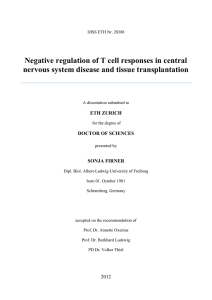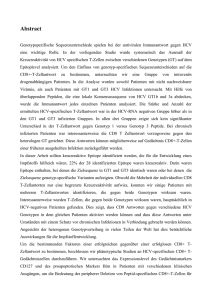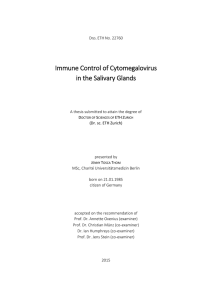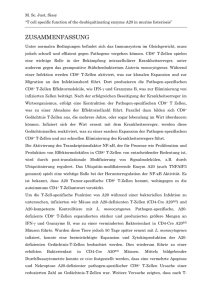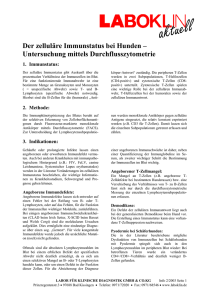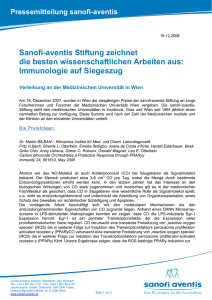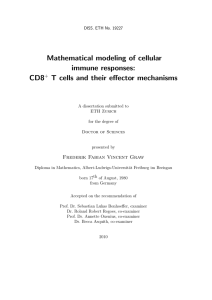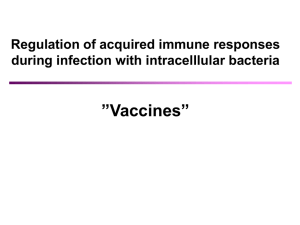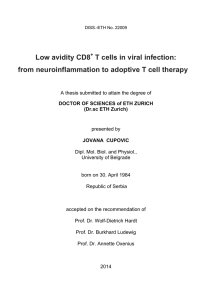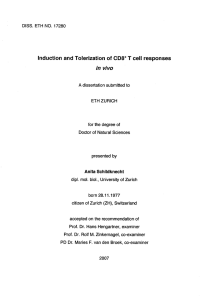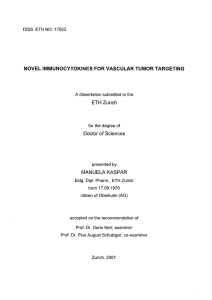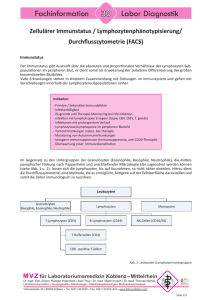Zusammenfassung - bei DuEPublico
Werbung
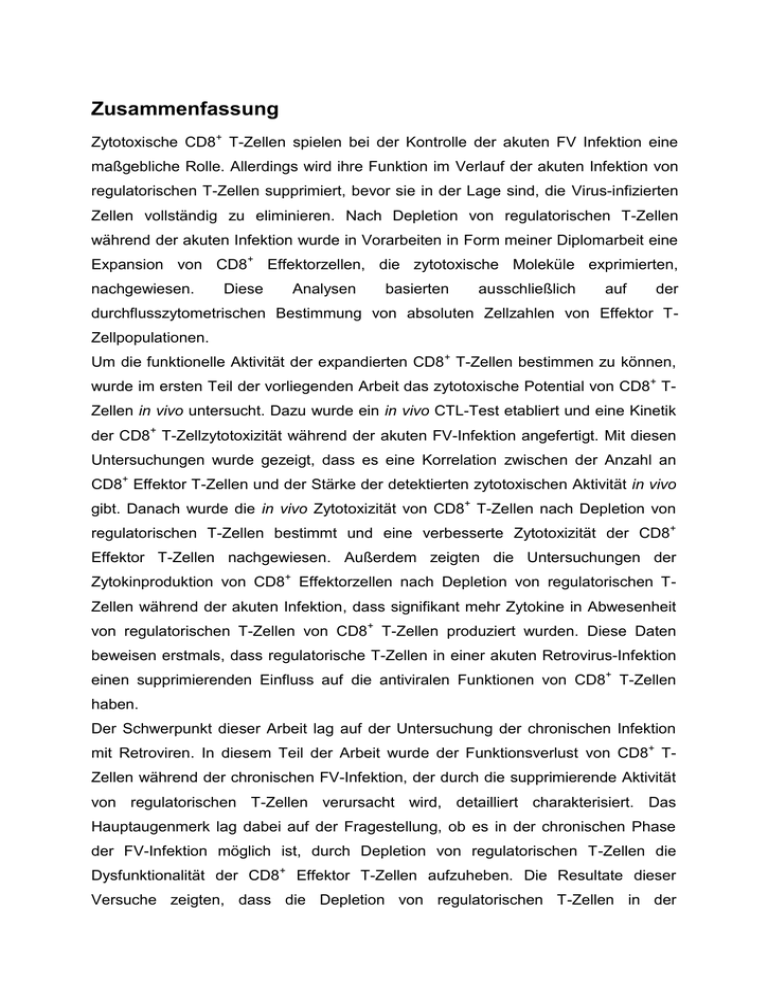
Zusammenfassung Zytotoxische CD8+ T-Zellen spielen bei der Kontrolle der akuten FV Infektion eine maßgebliche Rolle. Allerdings wird ihre Funktion im Verlauf der akuten Infektion von regulatorischen T-Zellen supprimiert, bevor sie in der Lage sind, die Virus-infizierten Zellen vollständig zu eliminieren. Nach Depletion von regulatorischen T-Zellen während der akuten Infektion wurde in Vorarbeiten in Form meiner Diplomarbeit eine Expansion von CD8+ Effektorzellen, die zytotoxische Moleküle exprimierten, nachgewiesen. Diese Analysen basierten ausschließlich auf der durchflusszytometrischen Bestimmung von absoluten Zellzahlen von Effektor TZellpopulationen. Um die funktionelle Aktivität der expandierten CD8+ T-Zellen bestimmen zu können, wurde im ersten Teil der vorliegenden Arbeit das zytotoxische Potential von CD8+ TZellen in vivo untersucht. Dazu wurde ein in vivo CTL-Test etabliert und eine Kinetik der CD8+ T-Zellzytotoxizität während der akuten FV-Infektion angefertigt. Mit diesen Untersuchungen wurde gezeigt, dass es eine Korrelation zwischen der Anzahl an CD8+ Effektor T-Zellen und der Stärke der detektierten zytotoxischen Aktivität in vivo gibt. Danach wurde die in vivo Zytotoxizität von CD8+ T-Zellen nach Depletion von regulatorischen T-Zellen bestimmt und eine verbesserte Zytotoxizität der CD8+ Effektor T-Zellen nachgewiesen. Außerdem zeigten die Untersuchungen der Zytokinproduktion von CD8+ Effektorzellen nach Depletion von regulatorischen TZellen während der akuten Infektion, dass signifikant mehr Zytokine in Abwesenheit von regulatorischen T-Zellen von CD8+ T-Zellen produziert wurden. Diese Daten beweisen erstmals, dass regulatorische T-Zellen in einer akuten Retrovirus-Infektion einen supprimierenden Einfluss auf die antiviralen Funktionen von CD8+ T-Zellen haben. Der Schwerpunkt dieser Arbeit lag auf der Untersuchung der chronischen Infektion mit Retroviren. In diesem Teil der Arbeit wurde der Funktionsverlust von CD8+ TZellen während der chronischen FV-Infektion, der durch die supprimierende Aktivität von regulatorischen T-Zellen verursacht wird, detailliert charakterisiert. Das Hauptaugenmerk lag dabei auf der Fragestellung, ob es in der chronischen Phase der FV-Infektion möglich ist, durch Depletion von regulatorischen T-Zellen die Dysfunktionalität der CD8+ Effektor T-Zellen aufzuheben. Die Resultate dieser Versuche zeigten, dass die Depletion von regulatorischen T-Zellen in der chronischen FV-Infektion zu einer erhöhten Anzahl an Virus-spezifischen CD8+ TZellen führte. Diese Zellen zeigten eine gesteigerte Proliferationsrate und eine erhöhte Produktion von Zytokinen und zytotoxischen Molekülen. Dies ließ auf eine verbesserte zytotoxische Aktivität der CD8+ Effektorzellen schließen, was mit einem in vivo CTL-Test bestätigt werden konnte. Die Aufhebung der durch regulatorische TZellen vermittelten Suppression von CD8+ Effektorzellen in der chronischen Infektionsphase ermöglichte also eine Reaktivierung der vorher dysfunktionalen Zellen. Eine Analyse der Viruslast zeigte, dass die Depletion von regulatorischen TZellen eine signifikante Reduktion der Viruslast in chronisch infizierten Tieren zur Folge hatte, die nicht nur kurzfristig war, sondern über einen längerfristigen Zeitraum Bestand hatte. Diese Ergebnisse verdeutlichen, dass die durch regulatorische T-Zellen vermittelte Immunsuppression ein signifikanter Faktor in der Etablierung und Aufrechterhaltung von chronischen viralen Infektionen ist. Immuntherapien, die sich auf eine Manipulation von regulatorischen T-Zellen konzentrieren, könnten also eine erfolgversprechende Strategie Infektionskrankheiten darstellen. für die Behandlung von chronischen Summary Cytotoxic CD8+ T cells are critical for the control of acute FV infection. However, they are functionally suppressed by regulatory T cells, compromising the ability of CD8+ T cells to completely eliminate the virus-infected cells. On the basis of preliminary work performed during my diploma, it was observed that depletion of regulatory T cells during the acute infection resulted in an expansion of effector CD8 + T cell population with enhanced production of cytotoxic molecules. These analyses were exclusively based on determination of absolute cell numbers of effector T cell populations by Flow cytometry. To identify the functional activity of these expanded CD8 + T cells, the cytotoxic potential of CD8+ T cells was analyzed in the first part of the present work. For that purpose an in vivo CTL assay was established and firstly, the kinetics of the CD8 + T cell cytotoxicity in the course of the acute FV infection was obtained. These studies indicated a correlation of the numbers of CD8+ T cells with the magnitude of the detected cytotoxic activity in vivo. Secondly, the in vivo cytotoxicity of the CD8+ T cells after depletion of regulatory T cells was analyzed. After depletion of regulatory T cells, an enhanced cytotoxicity of CD8+ T cells was found. Correlating with that the analyses of cytokine production after depletion of regulatory T cells showed an enhanced production of cytokines by the CD8+ T cells. These results demonstrated that regulatory T cells suppress the antiviral functions of CD8 + T cells during the acute FV infection. The main focus of the present work was on the analysis of chronic FV infection. In this second part of the work, the dysfunction of the CD8 + T cells during chronic infection, caused by the immunosuppressive regulatory T cells, was characterized in detail. Therefore, the emphasis was on the question, if it could be possible to abrogate the dysfunctionality of the CD8+ T cells during the chronic phase of infection by depleting regulatory T cells. The results of these experiments showed enhanced numbers of virus-specific CD8+ T cells after transient depletion of regulatory T cells. These cells showed increased proliferation rates, an increased production of cytokines and cytotoxic molecules. These results indicated an improved cytotoxic activity of the effector CD8+ T cells, which was verified by analyzing cytotoxicity in an in vivo CTL assay. In this respect, reversal of regulatory T cell-mediated suppression probably allowed a regain of function of previously exhausted effector CD8 + T cells. A conclusive analysis of the viral loads after short term depletion of regulatory T cells showed a significant long term reduction of the viral setpoints in chronic infected mice. These results demonstrate that regulatory T cell-mediated immunosuppression can be a significant factor in the maintenance of chronic viral infections and that Treg-targeted immunotherapy could be a valuable component in therapeutic strategies to treat chronic infectious diseases.
